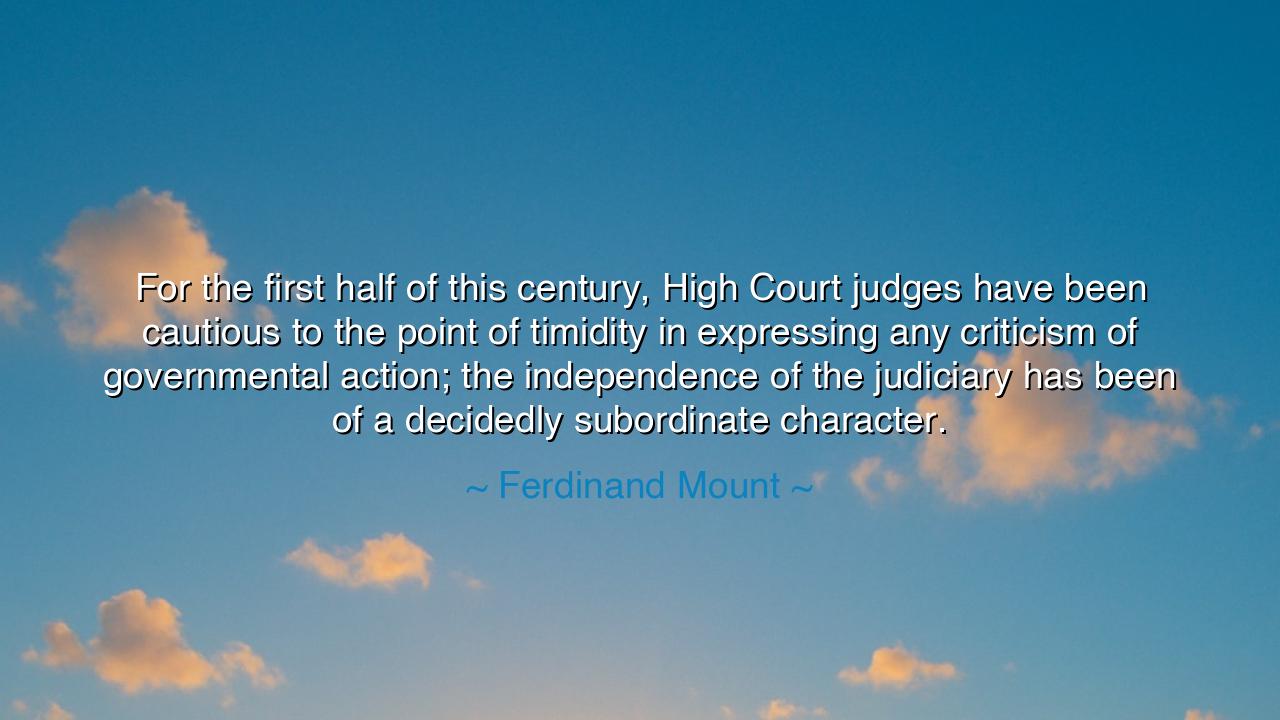
For the first half of this century, High Court judges have been
For the first half of this century, High Court judges have been cautious to the point of timidity in expressing any criticism of governmental action; the independence of the judiciary has been of a decidedly subordinate character.






Hear the reflective words of Ferdinand Mount, the British essayist and political thinker, who declared: “For the first half of this century, High Court judges have been cautious to the point of timidity in expressing any criticism of governmental action; the independence of the judiciary has been of a decidedly subordinate character.” In this statement lies not only an observation of history, but a warning to all free peoples — that the balance between power and justice must be guarded with eternal vigilance. For when the judiciary, the final refuge of fairness, bends its knee to the state, the very spirit of liberty trembles.
Mount’s words arose from the British tradition of governance, where the courts, the Crown, and Parliament dance a delicate and ancient waltz. He spoke of the twentieth century’s early decades, when judges, rather than confronting the growing authority of government, chose restraint — a restraint that, in his eyes, bordered on fear. It was a time when wars, economic depression, and the vast machinery of bureaucracy pressed upon the courts, urging them to yield to “necessity.” But as the ancients taught, justice must not be swayed by the winds of circumstance. To yield in crisis is to invite tyranny’s quiet return, step by cautious step.
Consider the warning of Cicero, who in the dying days of the Roman Republic, lamented that the guardians of law had become servants of politics. “The sword,” he said, “is in the hands of those who should have been ruled by the laws.” And so Rome, whose greatness had been founded upon discipline and legality, fell into the grasp of emperors who claimed divine right to rule. Mount’s reflection mirrors that ancient fall: when judges lose the courage to speak truth to power, nations risk exchanging liberty for comfort, and justice for obedience.
The independence of the judiciary is not merely an institutional arrangement — it is the soul of a free society. For what use are laws, however noble in writing, if those who interpret them tremble before authority? The ancients understood that the judge is not the servant of rulers, but the servant of justice itself — a principle higher than kings and ministers. When Mount speaks of “timidity,” he calls out not individuals, but a collective loss of moral strength. His tone is not contemptuous, but sorrowful, as one mourning the dimming of a sacred fire.
Yet history shows that courage, once lost, can be regained. Think of Lord Mansfield, who, in eighteenth-century England, declared in the case of Somerset v. Stewart that slavery could not exist upon English soil — though it meant defying powerful economic interests. Or of Justice Coke, who centuries earlier stood against King James I, proclaiming, “The King himself ought not to be subject to man, but subject to God and to the law.” Such voices remind us that true judicial independence is not born of status or salary, but of spirit — the spirit to speak justice even when it offends power.
Mount’s words, then, serve as a mirror to every generation of rulers and ruled alike. They remind us that independence, whether of courts or of conscience, is never a gift secure for all time. It must be defended anew in every age, against every pressure — political, social, or economic — that seeks to bend it. The judge who hesitates to criticize injustice becomes, unwittingly, its accomplice. Silence, when duty demands speech, is the slowest poison of all.
The lesson, dear listener, is this: where justice bows to convenience, freedom fades into memory. Each person who cherishes liberty must guard not only the independence of the courts, but their own moral independence — the courage to question, to dissent, and to uphold what is right. Let no government, however righteous it claims to be, silence the conscience of law. For as the ancients knew, a society remains free only so long as its judges remain fearless — and where the scales of justice tremble, the chains of servitude are never far behind.
Thus, let Mount’s words be more than remembrance; let them be a call to vigilance. For the law is not the servant of the state — it is the light by which the state itself is judged. And if that light is dimmed, who shall see the truth? Guard it, therefore, as you would guard liberty itself. For in the independence of the judiciary lies the very heartbeat of civilization.






AAdministratorAdministrator
Welcome, honored guests. Please leave a comment, we will respond soon